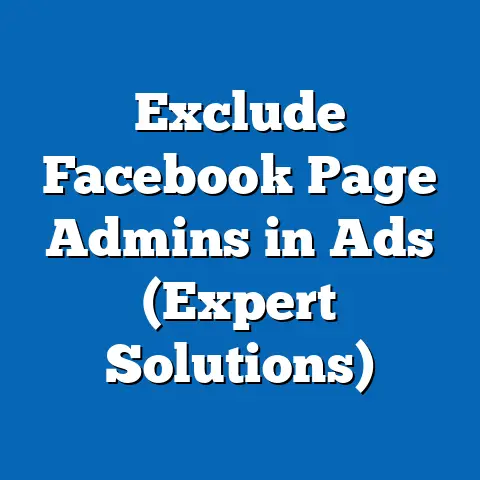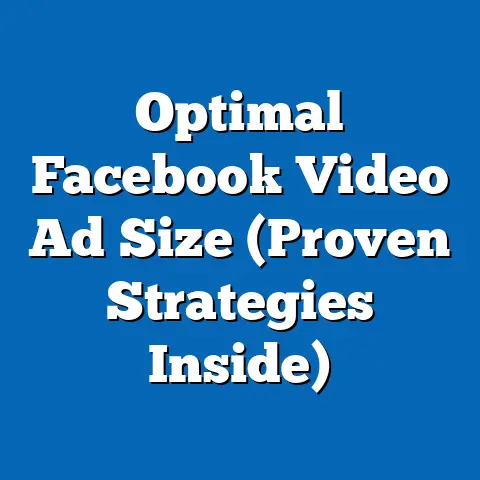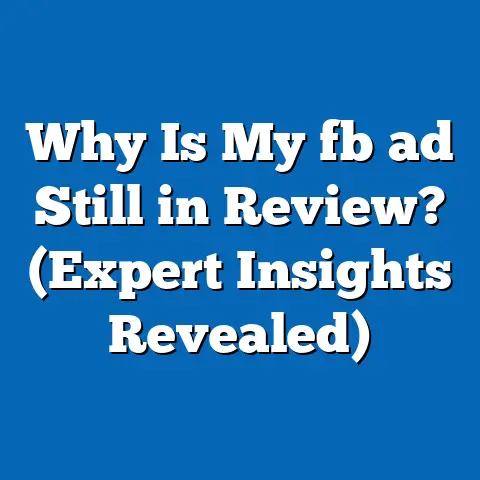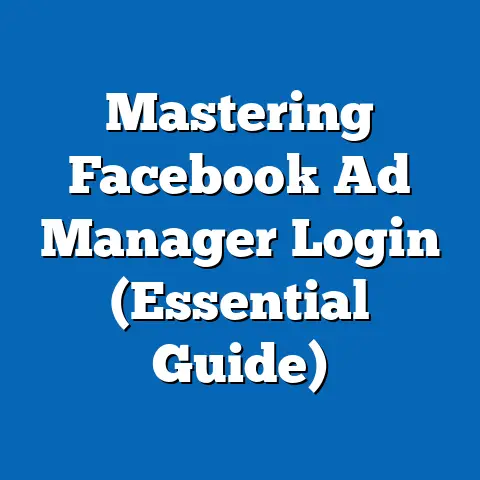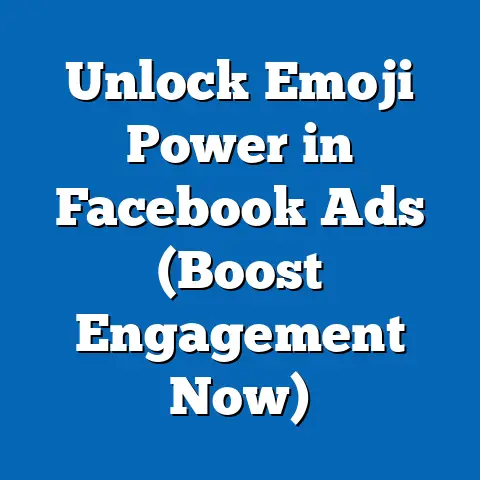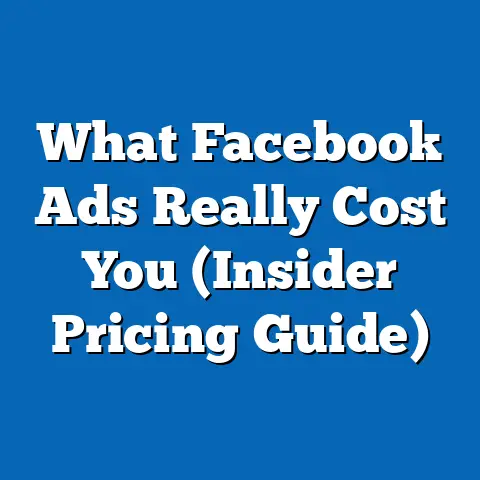Why You Should Delete Facebook Ads Account (Savvy Strategy)
In the dynamic world of digital marketing, versatility is not just an advantage; it’s a necessity.
Businesses today have access to a plethora of platforms and strategies to reach their target audiences.
The ability to adapt and shift marketing efforts across these diverse channels is crucial for sustained success.
While Facebook Ads has long been a staple for many, it’s time to ask a critical question: Is it still the best fit for your business?
I’ve seen firsthand how clinging to outdated strategies can hinder growth.
In this article, I’ll delve into why some businesses should seriously consider deleting their Facebook Ads account as part of a savvy, forward-thinking strategy.
It’s not about demonizing Facebook, but about recognizing that the digital landscape is ever-changing, and sometimes, the smartest move is to pivot.
The Changing Landscape of Digital Marketing
The realm of social media and digital advertising is in constant flux.
What worked yesterday might be obsolete today.
User engagement patterns are shifting, and the effectiveness of ads on platforms like Facebook is evolving.
It’s essential to stay abreast of these changes to make informed decisions about where to invest your marketing dollars.
Shifting Sands: User Engagement and Ad Effectiveness
We’re seeing a significant shift in how consumers interact with ads on social media.
A recent study by Pew Research Center found that while Facebook still boasts a large user base, younger demographics are increasingly gravitating towards platforms like TikTok and Instagram.
Furthermore, ad fatigue is becoming a real issue.
Users are bombarded with countless ads daily, leading to a decrease in attention spans and a higher likelihood of ad blindness.
I remember working with a client in the fashion industry a few years back.
They were heavily reliant on Facebook Ads, but their engagement rates were steadily declining.
We decided to experiment by allocating a portion of their budget to TikTok.
The results were astounding.
We saw a surge in brand awareness and a significant increase in website traffic, all at a lower cost per acquisition.
This experience highlighted the importance of diversifying our marketing efforts and exploring new platforms.
Beyond Facebook: Alternative Platforms Gaining Traction
The digital world offers a buffet of advertising options beyond Facebook.
Platforms like TikTok, LinkedIn, and even Pinterest are gaining significant traction and offering unique opportunities to reach specific target audiences.
- TikTok: With its short-form video format and viral potential, TikTok is a goldmine for brands targeting younger demographics.
- LinkedIn: Ideal for B2B marketing, LinkedIn allows you to connect with professionals and decision-makers.
- Pinterest: A visual discovery platform, Pinterest is perfect for brands in industries like fashion, home decor, and food.
These platforms often offer better ROI due to lower competition and more engaged audiences.
For instance, LinkedIn’s targeted advertising options can be incredibly effective for reaching specific job titles and industries, leading to higher conversion rates for B2B businesses.
Key Takeaway: Don’t put all your eggs in one basket.
Explore alternative platforms and adapt your marketing strategy to the evolving digital landscape.
The Diminishing Returns of Facebook Ads
While Facebook Ads can still be effective for some businesses, many are experiencing diminishing returns.
Engagement rates are declining, click-through rates are stagnating, and conversion rates are struggling to keep up with rising ad costs.
Decoding the Metrics: Engagement, CTR, and Conversion Rates
Let’s dive into the key performance metrics that paint a clearer picture of Facebook Ads’ current performance:
- Engagement Rates: This metric measures the level of interaction your ads receive, including likes, comments, shares, and saves.
A declining engagement rate suggests that your ads are not resonating with your target audience. - Click-Through Rates (CTR): CTR indicates the percentage of people who see your ad and click on it.
A low CTR could mean that your ad copy is not compelling enough or that you’re targeting the wrong audience. - Conversion Rates: This metric tracks the percentage of users who complete a desired action after clicking on your ad, such as making a purchase or filling out a form.
A low conversion rate suggests that your landing page is not optimized for conversions or that your product/service is not appealing to your target audience.
I remember running a Facebook Ad campaign for a local restaurant.
We initially saw promising results, but over time, our engagement rates plummeted, and our conversion costs skyrocketed.
We realized that our target audience was becoming oversaturated with ads and that our messaging was no longer standing out.
The Price is Not Right: Rising Costs and Diminishing Returns
The cost of running Facebook Ads has been steadily increasing over the years.
This is due to factors like increased competition, changes in Facebook’s algorithm, and the rising cost of ad placements.
As ad costs rise, businesses need to see a corresponding increase in returns to justify their investment.
However, many are finding that their ROI is not keeping pace with the rising costs, leading to diminishing returns.
A recent report by Statista found that the average cost per click (CPC) for Facebook Ads increased by 30% in the past year.
This means that businesses are paying more for each click, but they are not necessarily seeing a proportional increase in conversions or revenue.
Real-World Examples: Finding Success Beyond Facebook
Several businesses have successfully moved away from Facebook Ads and found better results on alternative platforms.
- Example 1: E-commerce Brand: A clothing retailer shifted their focus from Facebook Ads to influencer marketing on Instagram.
They partnered with relevant influencers to promote their products, resulting in a significant increase in sales and brand awareness. - Example 2: SaaS Company: A software company redirected their ad spend from Facebook to LinkedIn, targeting specific job titles and industries.
They saw a dramatic improvement in lead generation and conversion rates.
These examples demonstrate that there are viable alternatives to Facebook Ads that can deliver better results for businesses.
Ad Saturation: Breaking Through the Noise
One of the biggest challenges with Facebook Ads is the sheer volume of ads that users are exposed to daily.
This ad saturation makes it increasingly difficult for your ads to stand out and capture the attention of your target audience.
Users are becoming adept at filtering out ads, leading to lower visibility and effectiveness.
Key Takeaway: If you’re experiencing diminishing returns with Facebook Ads, it might be time to re-evaluate your strategy and explore alternative platforms.
Privacy Issues and Consumer Trust
In today’s digital age, privacy is a paramount concern for consumers.
The growing awareness of data security and privacy issues has led to increased scrutiny of platforms like Facebook.
This heightened awareness can significantly impact brand perception and consumer trust when using Facebook Ads.
The Privacy Paradox: Concerns and Consequences
Consumers are increasingly wary of how their data is being collected and used by companies.
Major data breaches and controversies surrounding Facebook have eroded public trust and raised concerns about privacy.
- Cambridge Analytica Scandal: This incident revealed how personal data from millions of Facebook users was harvested without their consent, leading to widespread outrage and calls for greater data protection.
- Data Breaches: Facebook has experienced several data breaches over the years, exposing the personal information of millions of users to hackers and cybercriminals.
These incidents have created a climate of mistrust around Facebook, making it more difficult for businesses to build strong relationships with their customers.
Transparency and Trust: A Competitive Advantage
Businesses that prioritize transparency and trust can gain a competitive advantage in the marketplace.
By distancing themselves from platforms like Facebook, companies can demonstrate their commitment to protecting consumer privacy and building ethical relationships.
I worked with a healthcare company that decided to scale back their Facebook Ads spending in response to growing privacy concerns.
They instead focused on building a strong online presence through organic content marketing and direct email campaigns.
This approach not only helped them build trust with their target audience but also resulted in higher engagement rates and more qualified leads.
Aligning with Values: A Brand’s Moral Compass
Consumers are increasingly choosing to support brands that align with their values.
If your target audience is concerned about privacy, using Facebook Ads might send the wrong message.
By moving away from the platform, you can demonstrate that you share their concerns and are committed to protecting their data.
Key Takeaway: Prioritizing transparency and trust can enhance your brand’s reputation and build stronger relationships with your customers.
The Impact on Brand Identity and Target Audience
Relying heavily on Facebook Ads can inadvertently dilute your brand’s identity and messaging.
It’s crucial to understand your target audience and ensure that your marketing efforts align with their preferences and values.
The Echo Chamber Effect: Diluting Brand Identity
Facebook Ads can sometimes lead to a generic marketing approach, where brands focus on broad targeting and standardized messaging.
This can dilute your brand’s unique identity and make it difficult to stand out from the competition.
I’ve seen brands lose their unique voice and personality when they rely too heavily on Facebook Ads.
They end up sounding like everyone else, making it harder to build a strong connection with their target audience.
Knowing Your Audience: Are They Still on Facebook?
It’s essential to know where your target audience spends their time online.
While Facebook still has a large user base, it may not be the primary platform for your specific demographic.
- Younger Generations: As mentioned earlier, younger demographics are increasingly gravitating towards platforms like TikTok and Instagram.
- Professionals: LinkedIn is the go-to platform for professionals and decision-makers.
- Visual Enthusiasts: Pinterest is a popular choice for users interested in visual content like fashion, home decor, and food.
If your target audience is not as active on Facebook as they once were, it might be time to shift your focus to other platforms where they are more engaged.
Redefining Marketing Approaches: Success Stories
Brands that have moved away from Facebook Ads have successfully redefined their marketing approaches and achieved better results.
- Example 1: Local Business: A local bakery shifted their focus from Facebook Ads to community engagement initiatives like sponsoring local events and partnering with other businesses.
This approach helped them build strong relationships with their customers and increase brand loyalty. - Example 2: Non-Profit Organization: A non-profit organization redirected their ad spend from Facebook to targeted email campaigns and online fundraising events.
They saw a significant increase in donations and volunteer sign-ups.
These examples demonstrate that there are creative and effective ways to reach your target audience without relying on Facebook Ads.
Aligning with Values: A Strategic Imperative
Aligning your marketing strategies with the values and preferences of your target audience is crucial for building a strong brand and fostering long-term relationships.
If your target audience values authenticity, transparency, and privacy, using Facebook Ads might not be the best approach.
Key Takeaway: Understand your target audience and align your marketing efforts with their preferences and values.
Conclusion
In conclusion, deleting your Facebook Ads account can be a savvy strategic move for businesses that are experiencing diminishing returns, concerned about privacy issues, or looking to redefine their brand identity.
Adaptability is key in marketing, and I encourage you to critically evaluate your current advertising strategies and consider the benefits of exploring alternative platforms.
The digital landscape is constantly evolving, and the best way to stay ahead is to be open to change and willing to experiment with new approaches.
Don’t be afraid to break free from the status quo and explore the myriad of opportunities that exist beyond Facebook Ads.
By doing so, you can unlock new levels of success and build a stronger, more resilient brand.
It’s time to take a bold step and embrace the future of marketing.

